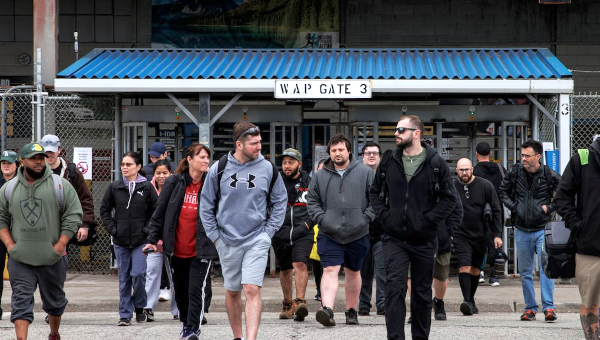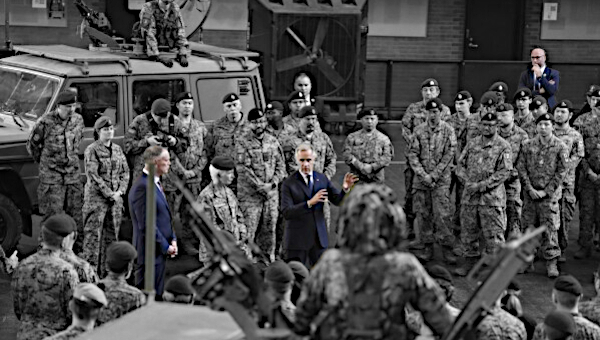
“On ne lâche pas” (We’re not backing down) — slogan of the student mobilization.
A society at war with its children is a society in deep crisis. Quebec’s student strike mobilization has set world records for duration and size. The organizational ability of the students has been remarkable, and escalating levels of disciplined popular support nothing short of astonishing. Tens of thousands are mobilized day after day, week after week and now month after month, and student support for the boycott of classes grows and becomes more solid.
The propaganda efforts of the Quebec government and the establishment media to smear the students as entitled, self-seeking brats, whining about modest tuition increases and seeking mayhem for its own sake have failed on two fronts. The students have responded with their own, well-organized information system which has found its way into the world press, and is transmitted instantaneously by cell phone and iPhone to hundreds of thousands. Those who follow the social media are better informed than those relying on the dailies and the big TV networks. The students simply dismiss the established media with the contempt it has earned. The smear campaign has also failed to turn Quebec society massively against the students. On the contrary, their popular support keeps building with growing numbers of sympathizers joining the students in the streets, often joyously banging pots and pans.

Kettle ’em, and cuff ’em.
Nevertheless the events we are witnessing should disturb us all. The spectacle of gangs of riot police clad in ominous black dispersing clouds of tear gas and pepper spray, wading into crowds swinging truncheons, boot stomping the hapless victims they manage to seize, firing rubber bullets and throwing percussion grenades, and dragging dozens off to jail are images long associated with police state repression. And it is being done to our children on the streets of our cities. So far the physical casualties have not been deeply tragic: split scalps, minor concussions, bruises and contusions, a few broken bones, a lost eye, and relatively minor property damage. But that could change in an instant as Quebec Premier Jean Charest continues to roll out the police state to the applause of far too many Canadians, and to the cheers of much of the established media. All it takes is one trigger happy cop, or one over-zealous truncheon blow, encouraged by the calls for repression and the chorus of denunciation directed against the students.
Getting Tough With Students
Charest’s political motives behind his handling of the student uprising were clear from the outset. When the expected student mobilization against the tuition hike – 82 per cent staged in over 7 years – began in February 2012, Charest made it clear he would not relent. He had been criticized as weak and soft on previous occasions for backing off tuition increases when confronted by student protest. In 2012 Charest was already a defeated premier. The consensus was, and the polls confirmed, he faced certain defeat in the next election. The recent revelations about deep corruption in the relationships between the government, the construction industry, and organized crime only made that defeat more certain and probably more catastrophic. By refocusing public attention on getting tough with students and imposing law and order on ‘mob rule,’ Charest’s panic and desperation became clear. He was gambling on riding the defeat of the students to victory, or at least a less humiliating defeat.
Charest miscalculated badly. He believed a refusal to negotiate, and a tough, no compromise stance, would finally break the back of the student mobilization, especially as final exams loomed and students faced the loss of academic credit. The opposite happened. Charest’s hard line resulted in an even more massive mobilization galvanizing even more student support, leading to huge demonstrations day after day. Charest panicked and opted for naked state repression to crush the students.
Bill 78 was rammed through the Quebec National Assembly on 18 May 2012. Officially titled “An Act to enable students to receive instruction from the post-secondary institutions they attend,” the law would be better identified as “The Temporary Quebec Police State Act.” The police are now the arbiters of, and gatekeepers to, the practice of democracy in Quebec. Any gathering of 50 or more must give police notice including the itinerary, duration and time. Police can refuse permission, or order changes in the plan. Demonstrations and picket lines are forbidden within 50 meters of the boundaries of post-secondary institutions. Teachers, leaders of student and teacher union organizations are required to “induce” students to obey the law or face prosecution. The fines imposed for violations are nothing short of legalized financial terrorism: $1,000 to $5,000 for individuals; $7,000 to $35,000 for student leaders; $25,000 to $125,000 for unions and student organizations – to be doubled for the second and any subsequent offence.
The law flagrantly and knowingly violates numerous provisions of the Canadian Charter of Rights and Freedoms. The law expires 1 July 2013 before any constitutional challenges can wend their weary way through the courts, but it will have served its political purpose of crushing the student mobilization. Besides this use of legal and financial terror to repress the movement, the anti-terrorist squad has been ordered by the Minister of Public Safety to interview student leaders, a clear act of heavy-handed intimidation. Montreal’s City Council joined the parade of repression by banning the wearing of masks during demonstrations (thus depriving protesters the protection of choice against tear gas and pepper spray). Not since the notorious section 98 amendment to the Criminal Code in the aftermath of the 1919 Winnipeg General Strike has such a brutally repressive and flagrantly anti-democratic law been adopted in Canada.
Fighting the Neoliberal Juggernaut
The repression has so far failed to break the students. Indeed, the mobilization has grown stronger and more determined, convinced that Charest’s behaviour was an act of desperate, heavy-handedness and a final admission of political failure. Huge demonstrations in Montreal, and many smaller ones throughout the province, continue in open defiance of the law, with the students now joined by large numbers opposed to the law and its attack on democracy. On 22 May over 100,000 (students claim a lot more) marched in Montreal in defiance of the law, and on 28 May hundreds of robed lawyers marched in solidarity with the students. Over 500 lawyers have offered their pro bono services to carry on the battle in the courts.
Hundreds have been arrested. The mobilization, the repression, and the arrests continue, now including leader of Québec solidaire and Member of the Quebec National Assembly Amir Khadir. He was arrested on June 6 in Quebec City. The next day his Montreal home was raided and Khadir’s daughter and partner, both prominent student leaders, were arrested. They were among 11 student leaders arrested in during dawn police raids in Montreal.
“…It is about what the neoliberals contemptuously call ‘entitlements’ to education, healthcare, jobs, economic security, a reasonable life, ‘entitlements’ that must be taken away or cut severely… These are not ‘entitlements,’ rather they are ‘the rights of citizenship’ in any free and democratic society.”
Canada’s media have behaved shamefully throughout, acting as servile cheerleaders of Charest’s repression and carrying out a negative propaganda offensive against the students. Citizens had to go abroad to get balanced, informative analysis. The Guardian in the UK and Al Jazeera English provided better reportage and analysis than The Globe and Mail. The best coverage was provided by Concordia Student TV and the student press in general. It was only on 2 June 2012 that The Globe and Mail woke up, announcing on its front page, “It’s Not About Tuition Any More,” providing two full pages of analysis and background.
It was never only about tuition. It was about what is happening here and abroad as the austerity measures imposed by neoliberalism wreck the lives of growing numbers of people, especially the younger generation. It is about what the neoliberals contemptuously call ‘entitlements’ to education, healthcare, jobs, economic security, a reasonable life, ‘entitlements’ that must be taken away or cut severely. Quebec students and others fighting back against the neoliberal juggernaut are answering clearly. These are not ‘entitlements,’ rather they are ‘the rights of citizenship’ in any free and democratic society. We intend to take them back and to extend them in an effort to build a humane and civilized society.
Neoliberalism’s answer in Quebec, and around the world, is the same as the answer of capitalism whenever it has been threatened by democracy and popular mobilizations in the past: repression and naked force. The question we face is nothing less than ‘who rules, who has the power?’ And by the way, whatever became of democracy? •





